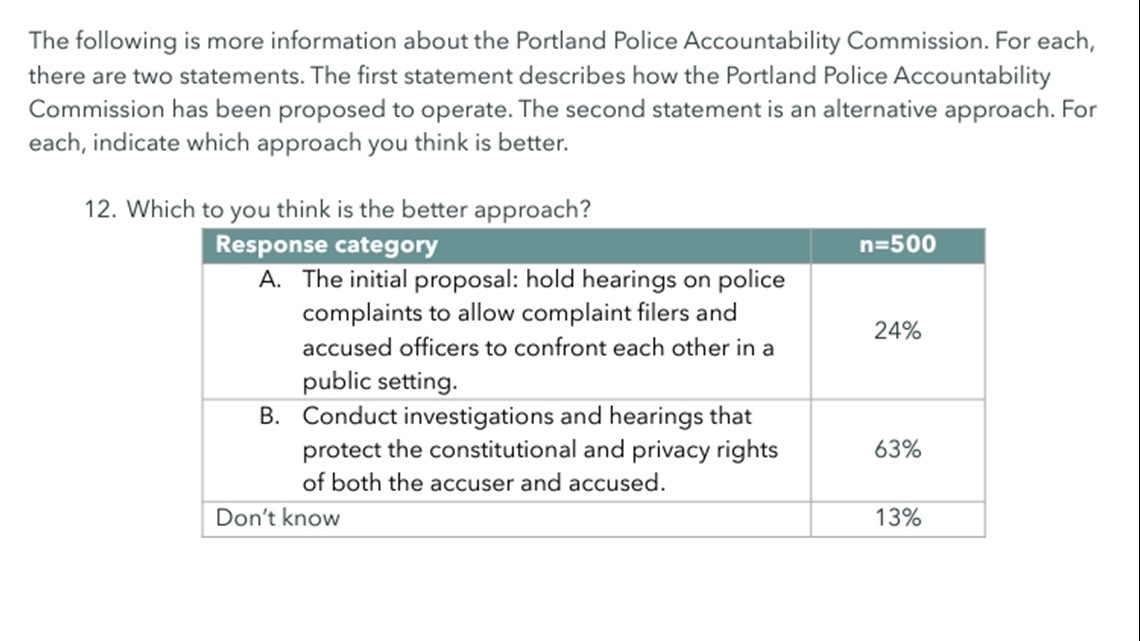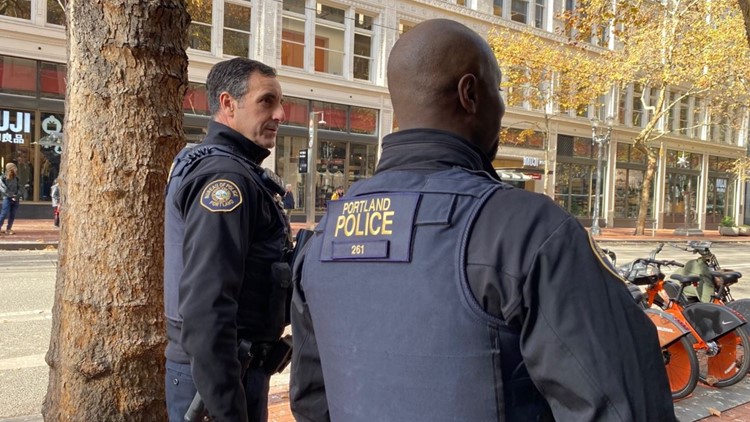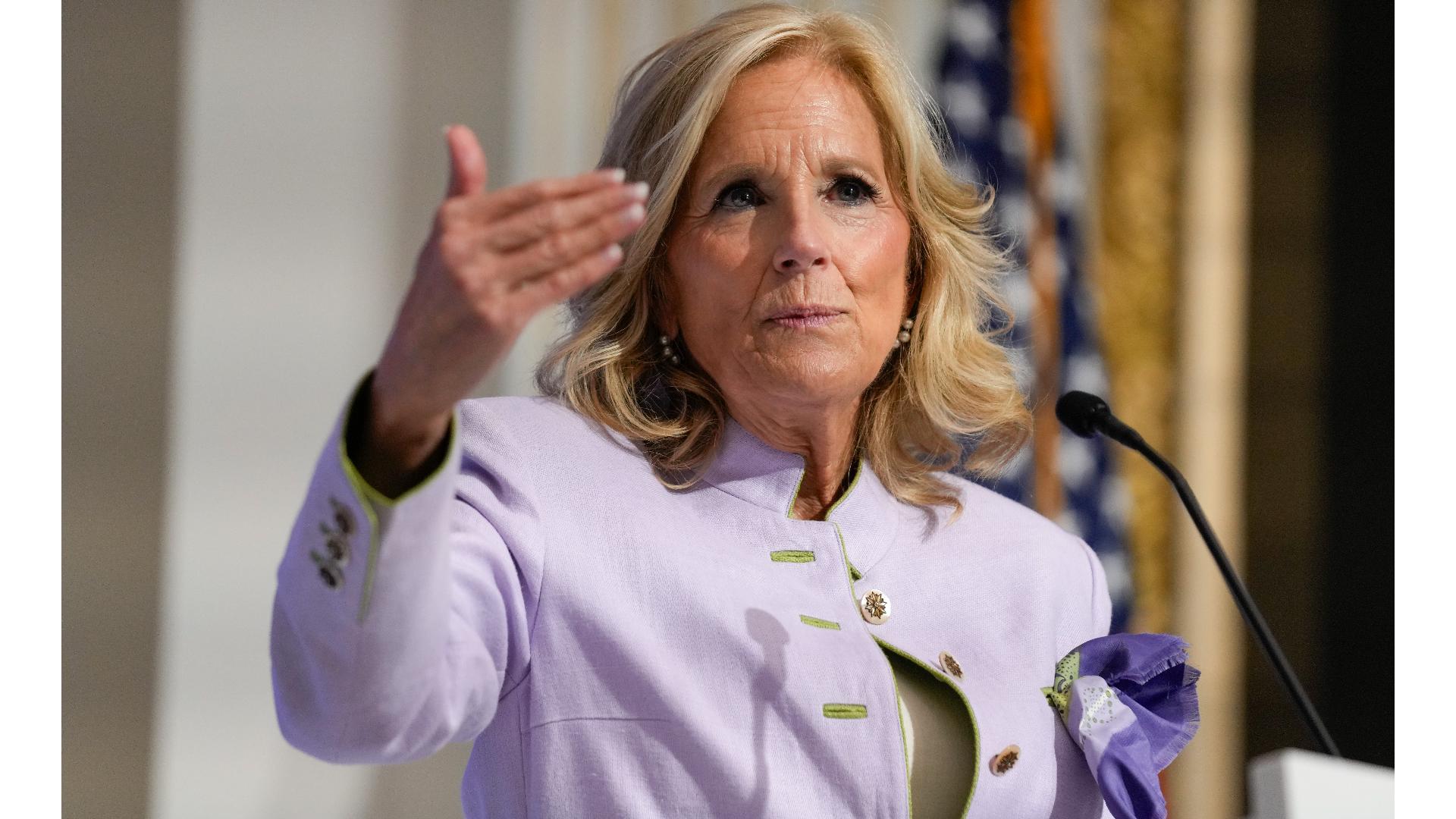PORTLAND, Ore. — Portland voters want to water down aspects of a forthcoming police oversight board that they overwhelmingly approved back in 2020, according to the results of a new poll commissioned by the Portland Police Association.
The idea for a new oversight board made up of only civilians came from former Portland Commissioner Jo Ann Hardesty, who succeeded in getting the proposal through the council and sent out on ballots for the Nov. 2020 election. When the dust settled, 82% of Portland voters approved the measure.
As soon as voters passed the 2020 measure for the new oversight body, the Portland Police Association sued to block it, calling it “terrible public policy.”
Portland currently has three different bodies tasked with different aspects of overall police oversight, two of which are made up primarily of civilians. But importantly, the civilian committees don't have any say in disciplinary decisions — something the new oversight body will be empowered to do. Eventually, the new board is intended to replace the existing three.
Also unlike the existing oversight bodies, the new board has strict rules about its members being from a diversity of backgrounds, but mandates that no current or former law enforcement employees or immediate family members participate.
In the years since the measure passed, the city-appointed Police Accountability Commission has been meticulously crafting a final proposal to put before Portland City Council that would solidify the new body. The council unanimously approved an ordinance based on that proposal in November, but not before making significant last-minute changes that prompted protests from members of the PAC, who called it a "big step backwards."
Despite the changes made by members of the city council, the new oversight board still has an enemy in the Portland police union.
PPA's polling
In a statement released alongside new polling on Tuesday, the PPA painted the Police Accountability Commission's work as a false choice between safety and police accountability, indicating that it would "sacrifice public safety in the name of extremism" by driving officers away.
“We do not share this information to paint a dire picture of our City’s future. Instead, this is a call to the voices who have felt unheard,” said Sgt. Aaron Schmautz, PPA president. “Accountable, constitutional, and transparent policing is not an impossible goal. In many ways, the police in Portland have been held to the highest of standards for a very long time."
Commissioned by the PPA, local polling firm DHM Research conducted a hybrid survey of Portland voters from Dec. 2 to 7. The survey consisted of 500 people and was conducted either over the phone or by sending a text message that directed the participant to an online survey.
The survey questions began with more general issues of outlook on the current state of affairs in Portland and thoughts about public safety, not unlike a similar poll commissioned by the advocacy group People for Portland in May and the Portland Insights Survey conducted this year.
Respondents identified homelessness, crime and public safety, and drugs as their top three concerns, though homelessness was more than twice as likely to be the primary problem (43%) compared to the other two (22% and 20% respectively).
Over half of respondents (56%) said they would consider leaving Portland if they could afford it, and 68% said that "Portland is losing what made it special."
Respondents overwhelmingly felt that crime has increased over the last few years, and were concerned about being at risk of becoming a victim of crime. Only about 11% of people were in any way satisfied with the state of public safety in Portland, and 71% said that the city should have more police officers.
From there, the questions became more concerned with the Police Accountability Commission, conflating the volunteer group that drafted the final proposal with the end product. About 67% of respondents said they were aware of it, so the remaining people were thereafter responding to something with which they were unfamiliar.
The poll then posed different propositions to participants, one characterizing the police oversight board as approved by voters and one that, presumably, the police union would prefer. Here's the first example:
Which to [sic] you think is the better approach?
A. The initial proposal: hold hearings on police complaints to allow complaint filers and accused officers to confront each other in a public setting. (24%)
B. Conduct investigations and hearings that protect the constitutional and privacy rights of both the accuser and accused. (63%)
Don't know (13%)


It's unclear how the proposal put forward by the Police Accountability Commission could conceivably hold up to a legal challenge if it did, as the second proposal insinuates, violate the constitutional and privacy rights of the parties involved. In a summary of that proposal, the PAC specifically notes that the process would be open to the public "where legally permitted."
In subsequent questions on the survey, 33% of respondents said that they prefer prohibiting "anyone who has had a relative work in any type of law enforcement" from serving on the oversight board, while 58% said that they'd rather allow "anyone who is deemed qualified and fair-minded" to serve.
Only 14% of respondents said that they wanted members of the oversight board determining what constituted improper officer behavior and punishment "without reviewing training materials or receiving legal background information." By contrast, 73% supported the oversight board being briefed on police legal issues, and attending trainings or ride-alongs with officers.
Respondents also favored more oversight of the oversight board itself, and fewer benefits in terms of pay and insurance.
But responses were nearly split when it came to the oversight board's authority to investigate all complaints of police misconduct instead of just reviewing the results of police investigations and other government inquiries "so not to duplicate or disrupt those findings."
When it came to the oversight board's power to mete out punishments, 37% supported giving it full authority to issue punishments or dismiss Portland police officers, while 47% thought that the oversight board should make recommendations based on its findings while leaving any actual decision-making to the police chain of command, which is how things currently work.
Overall, 57% of respondents indicated that they would rather the city council make changes to the oversight board and send it back to voters, compared to 23% who wanted it kept as-is.
Despite all of those responses in seeming opposition to the police oversight measure that voters passed, 42% of those surveyed still said that the oversight board would likely improve public safety as initially proposed, while 23% thought it would have no effect, 18% thought it would make public safety worse and 17% said they didn't know.
Hypothetical measures
The poll then asked respondents to consider a series of hypothetical measures for the Nov. 2024 ballot, the first of which would redirect Portland's portion of marijuana revenues toward increasing the number of police officers and creating a 24-hour "detoxification drop-off and treatment center for drug addicts," among other items.
It's not clear what the questions mean by directing Portland's marijuana tax revenues elsewhere. Most marijuana tax revenues go toward a state fund that now primarily bankrolls drug treatment programs through Measure 110, although it also funds things like state police, local governments and schools.
Portland also passed its own 3% marijuana tax in 2016, which goes toward drug and alcohol treatment, public safety investments, and support for neighborhood small businesses.
Regardless, over half of respondents strongly supported these hypothetical measures, and 30% somewhat supported them.
And while the Portland Police Bureau has made no secret of the fact that it has faced a staffing crisis for years, the agency has not pointed toward budget shortfalls as the main barrier, instead citing struggles with recruitment and backlogs at the state police training academy.
Respondents were about evenly divided on whether they'd support a measure repealing the police oversight board measure so that its 5% slice of the PPB budget could be redirected toward hiring and training more officers.
On the other hand, an overwhelming 82% supported, to some extent, the idea of an initiative that would force the city of Portland to strengthen recruitment and training of police, and to "provide incentives for officers to live in Portland."
The poll also floated the idea of an initiative that would force Portland to create enough shelters for homeless people that existing city laws against street camping could be enforced. An even larger portion of respondents supported that (83%), but the question did not indicate where Portland would get the funding to create shelter that is not already being allocated.



